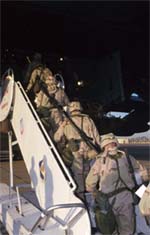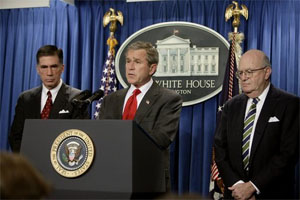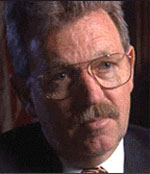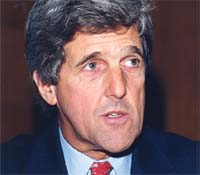
|
|
|
|
What Didn't Bush Know? and When Didn't He Know It? |
|
While Mike Wallace takes on the case of the exposed breast, the rest of Sixty Minutes' crack investigative team might turn its collective eye toward Weapons-Gate, a scandal much bigger than Breast-Gate. In its current incarnation, The Weapons-Gate Tale has no Punxsutawney Phil, and you won't find Bill Murray or Andie MacDowell. But we have found George W. Bush insisting that Iraq had weapons of mass destruction over and over and over again. Reinventing the truth is a recurring theme of presidential politics: Lyndon Johnson lied about the Gulf of Tonkin incident which got the U.S. buried chin-deep in Vietnam; Richard Nixon lied about Watergate and nearly destroyed democratic institutions; Ronald Reagan most likely lied about his lack of knowledge of the Iran/Contra mess resulting in years of death and destruction in Central America; and Bill Clinton lied about having sex with an intern (lesser lie, but really stupid), leading to his impeachment and loss of credibility. George W. Bush's WMD Tale led the U.S. into the current mess in Iraq. Unlike Johnson who resigned rather than run again and face defeat; Nixon who resigned rather than be impeached; Reagan, who managed to escape into the fog of his oncoming illness; and Clinton, who took the Democratic Party down with him; George W. Bush is facing the music in the here and now. With his poll numbers dropping and his refusal to express remorse, the president emulates Reagan in invoking the time-honored concept of "plausible deniability." When it rains, it pours When my mother used to say "when it rains, it pours," I think she was talking about bad news cascading down upon more bad news. Although this year's Super Bowl spectacle is history, Janet Jackson's breast lingers in the headlines. Some in the public, however, might prefer less-weightier matters like: Did the president lie about Iraq's possession of weapons of mass destruction? After a week of moon-walking and slight of hand, in a dramatic shift, President Bush agreed to sign an executive order establishing an "independent commission" to look into Weapons-Gate. But the investigation may be limited to so-called "intelligence failures" and not what the president knew and when did he know it. (Don't be surprised if the mid-seventies Select Committee to Study Governmental Operations with Respect to Intelligence Activities of the United States Senate - also known as the Church Committee, headed by Idaho Senator Frank Church - aimed at reforming U.S. intelligence agencies in the post-Watergate period comes in for intense criticism.) The Washington Post reported that "By setting up the investigation himself, Bush will have greater control over its membership and mandate. The senior White House official said it would be patterned after the Warren Commission, so named for its chairman Earl Warren, a former chief justice of the Supreme Court, which led a 10-month investigation that concluded in 1964 that Lee Harvey Oswald acted alone in killing President John F. Kennedy." The Warren Commission's report certainly closed the door on doubts about Kennedy's assassination! Who will be appointed to this commission has yet to be revealed. Can anyone say George Schultz, Lawrence Eagleburger and Brent Scowcroft, and independent in the same sentence? Ten days that shook the administration
At its core, Dr. Kay places the blame at the doorstep of America's intelligence agencies. He believes the president was caught in the middle of a failure of the intelligence agencies, and less-than-cooperative UN inspectors. If there were documents proving WMD existed, Dr. Kay thinks it is possible looters walked off with them when U.S. troops weren't watching. On February 1, Peter Beaumont, Gaby Hinsliff and Paul Harris, reporting for Britain's Observer, writes that "Senior American officials concluded at the beginning of last May that there were no weapons of mass destruction (WMD) in Iraq." Their conclusion, based on interviews with intelligence sources, policy makers and weapons inspectors "familiar with the details of the hunt for WMD" claims that it was "widely known that Iraq had no WMD within three weeks of Baghdad falling, despite the assertions of senior Bush administration figures and the Prime Minister, Tony Blair." Instead of attacking Dr. Kay - as it is wont to do in other situations (the Paul O'Neill case is a most recent example), Bush Administration officials have taken to praising his performance while doing a little Michael Jackson-like Moon-walking of their own - slowly backing off from their repeated claims that Iraq had WMD. National security adviser Condoleezza Rice recently "defended Bush's decision to go to war and said the United States may never learn the whole truth about Iraq's weapons capabilities because of looting, which U.S. forces failed to stop immediately after the invasion," Reuters reported. Vice president Dick Cheney rather reluctantly joined the "maybe they didn't have WMD after all" chorus. Formerly known as the great guarantor, as in I guarantee you Iraq had weapons of mass destruction, Britain's Financial Times reported that Cheney also recently defended the war while leaving "open the question of whether Saddam Hussein had possessed weapons of mass destruction." Responding to questions about the fact that Kay's team, searching Iraq for months, failed to come up with anything, Cheney said: "There's still work to be done to ascertain exactly what's there, and I am not prepared to make a final judgment until they have completed their work." I guess he's run out of final judgments, having run out of them in the pre and post-war rationalizing. Dr. Kay 'vindicates' Bush?
 For the past week or so David Kay has been the man of the hour. Faulty intelligence is his story and he's sticking to it. He toddled around Washington, using every bit of his fifteen minutes and then some, "seem[ing almost] to be enjoying himself" the New York Times noted.
For the past week or so David Kay has been the man of the hour. Faulty intelligence is his story and he's sticking to it. He toddled around Washington, using every bit of his fifteen minutes and then some, "seem[ing almost] to be enjoying himself" the New York Times noted.
After a closed-door session with members of the Senate Intelligence Committee, Kay told reporters: "We've had a number of surprises. It's quite clear we need capabilities that we do not have with regard to intelligence." Kay later told the Senate Armed Services Committee that "we were almost all wrong - and I certainly include myself here," in believing Iraq had WMD. "I believe that the effort that has been directed to this point has been sufficiently intense that it is highly unlikely that there were large stockpiles of deployed militarized chemical and biological weapons there," Kay said. He also recommended launching an independent investigation, even expressing uncertainty to Jim Lehrer on PBS' News Hour as to why the Bush Administration would object to such an investigation. Having served the administration well before the invasion and during the occupation, according to administration comments, Dr. Kay is now essentially taking the heat off the president. Right wing columnist David Limbaugh claimed in a column that Kay vindicated the president. Frank Gaffney, president of the Center for Security Policy, went a step further. Relieved that Dr. Kay wasn't chastised by the administration Gaffney suggests that he should be rewarded. "The president should…feel grateful…both for his past, courageous public service and for his present candor. And there is no better, or more appropriate, way to express his appreciation than to ask him to replace George Tenet as Director of Central Intelligence (DCI)," Gaffney wrote in a recent National Review Online column. Gaffney: "For example, Dr. Kay has made clear that, if there is fault to be found over Iraq's weapons of mass destruction, the blame should lie with those intelligence officials who produced the faulty data, not those policymakers who made decisions on the basis of it. As he told National Public Radio last Sunday, 'It's an issue of the capabilities of one's intelligence service to collect valid, truthful information.'" According to Gaffney, "in congressional testimony" Kay said he thought "the intelligence community owes the president [an apology] rather than the president owing [one to] the American people." Gaffney says Kay warned Bush's critics that, "We have to remember that this view of Iraq was held during the Clinton administration and didn't change in the Bush administration. It is not a political 'got you' issue. It is a serious issue of how you could come to the conclusion that is not matched by the [facts]." On the February 1st edition of Fox News Sunday, host Chris Wallace asked Dr. Kay whether intelligence analysts were "pressured" into finding that Iraq had WMD. The only way we will find out the answers to that question and many other would be through an independent commission.
"At the same time that we know there were terrorist groups in state still seeking WMD capability. Iraq, although I found no weapons, had tremendous capabilities in this area. A marketplace phenomena was about to occur, if it did not occur; sellers meeting buyers. And I think that would have been very dangerous if the war had not intervened." Why should the public pay attention to Dr. Kay's observations? Before Bush's invasion, as one of its loudest and persistent advocates Dr. Kay was cock-sure Iraq had WMD and that they were a threat to the American people. And he shared these beliefs in a number of venues, in print and in appearances on cable television's talking-head programs. He was dead wrong. Does his admission of the failure to find WMD make him a beacon of clarity now? He didn't find WMD but still believes the invasion was worthwhile. There's no evidence linking Iraq to 9/11, but Dr. Kay still supports in the invasion. More than 500 U.S. soldiers have been killed and thousand wounded; thousands of Iraqis have been killed and wounded and Dr. Kay still believes in the invasion. While not expecting President Bush to morph into Bill Murray, it would be useful - if somewhat out of character - to hear "I take full responsibility" pass the president's lips. Until then, we should carefully monitor Bush's "independent commission." And we should encourage independent journalists to continue digging into Weapons-Gate. But beyond that, a truly independent inquiry - along the lines of the Bertrand Russell Tribunal on Vietnam - needs to be held. A series of steps should be taken so that an independent international commission can be put in place. In the end, Weapons-Gate is a scandal that could really rock the vote. |
 George W. Bush appoints former Democratic Sen. Chuck Robb (left) and Republican Judge Laurence Silberman (right) to head a commission to investigate WMD intelligence before the start of the Iraq War
George W. Bush appoints former Democratic Sen. Chuck Robb (left) and Republican Judge Laurence Silberman (right) to head a commission to investigate WMD intelligence before the start of the Iraq War  Dr. David Kay, who was sent to Iraq to find WMDs, says he has found no evidence Saddam Hussein had stockpiles of those weapons
Dr. David Kay, who was sent to Iraq to find WMDs, says he has found no evidence Saddam Hussein had stockpiles of those weapons  Democratic presidential candidate Sen. John Kerry wants to know if the Bush Administration deliberately misled Congress
Democratic presidential candidate Sen. John Kerry wants to know if the Bush Administration deliberately misled Congress